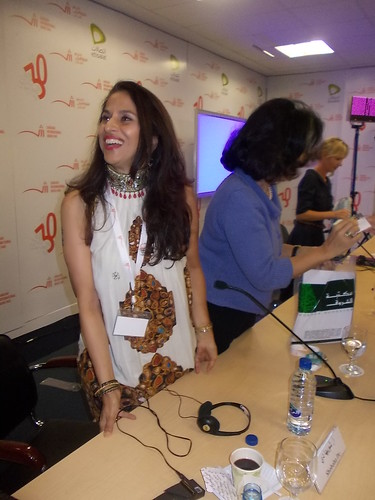Shobhaa De. More on yesterday’s Woman’s Voice panel:
“In too many cultures, and too many countries, women speak the same language… of silence.”
So began bestselling Indian novellist Shobhaa De, quoting an Indian poet whose name I did not catch (can anyone help?), adding: “Today more women are breaking the silence with bravery, sensitivity and passion.”
Shobhaa spoke about how lucky she was to be a writer who lives in a democracy, where no matter what, voices at least have the right to be heard. But even in that condusive environment it is not easy to be a woman who writes.
Shobhaa was one of the first female novellists in India. Her first book was commissioned by a publisher, who nonetheless told her: “In our experience, madam, people are not interested in what women have to say. In our experience, madam, people do not buy books by women, there is no market.”
When her first book came out, this prophecy appeared true, as it received “the worst reviews a writer can imagine receiving” – an astounding 235 of them.
However, this turned out to be a blessing in disguise, as the terrible reviews galvanised readers into buying the book to see for themselves, causing a sensation when the novel became a bestseller (and proved the publisher wrong, though in a weird kind of way).
Of this phenomenon, Shobhaa says: “When your terrible reviews cause many, many people to buy your book, the bad reviews hurt less and less and after a while they don’t hurt at all.”
Seventeen books later, Shobhaa remains a bestselling novellist, and continues to be ‘uncontrollable’; to buck trends and be successful for it. “There is a lot of stereotyping in literature; women are meant to write certain kinds of books. I don’t write those books.”
Like Sunetra Gupta, Shobhaa has learned lessons as a writer:
I realised the language of silence is a trap. Women speak two languages: our mother tongue and the one we want to speak, a secret language. For many women the writing itself is a subversive and surreptious action. You feel guilt. You think there is something more legitimate that you should be doing. Perhaps you are neglecting your family? Perhaps you are neglecting your children?
The hostility we come up against can paralyse us or can trigger us. For the women who want to write: don’t let anything or anyone stop you.
There are myriad ways that women are made to feel unworthy of being writers – from the personal to the political. (Skeptical? Look at what Sophie Cunningham said on this topic recently at the Melbourne Writers’ Festival and what Bidisha wrote last year for the Guardian.) But the more we are excluded the more important it is that we continue to write the stories that inspire us.
As discussed over the last few days, all kinds of writing reach all kinds of people in all kinds of way. Writing is a powerful tool. Make time for it and make your voice heard.


No comments:
Post a Comment